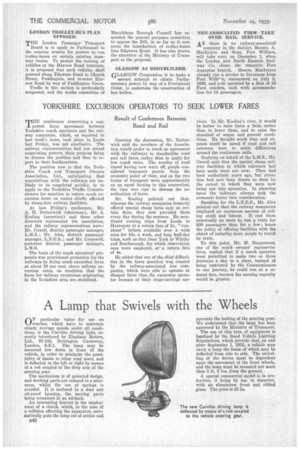YORKSHIRE EXCURSION OPERATORS TO SEEK LOWER FARES
Page 52

If you've noticed an error in this article please click here to report it so we can fix it.
Result of Conference Between Road and Rail
T"conference concerning a suggested fares agreement between Yorkshire coach operators and the railway companies, which, as reported in last week's issue, took place in Leeds last Friday, was not conclusive. The railway representatives had not actual negotiating powers, their purpose being to discuss the position and then to report to their headquarters.
The position now is that the York shire Coach and Transport ters Association, Ltd., anticipating that negotiations with the railways are unlikely to be completed quickly, is to apply to the Yorkshire Traffic Commissioners for sanction to reduce coach excursion fares on routes chiefly affected by cheap-fare railway facilities.
At last Friday's conference, Mr. A. H. Butterwick (chairman), Mr. J. Keeling (secretary) and three other directors represented the association, and the railway representatives were : Mr. Cowell, district passenger manager, L.M.S.; Mr. Ale; district passenger manager, L.N.E.R.; and Mr. Creswell, assistant district passenger manager, L.M.S.
The basis of the coach operators' proposals was provisional protection for the railways by fixing coach excursion fares at about 10 per cent. above railway excursion rates, on condition that the fares for railway excursions originating in the Yorkshire area are stabilized.
Opening the discussion, Mr. Butterwick said the members of the Association would prefer to reach an agreement with the railways to standardize road and rail fares, rather than to apply for low coach rates. The novelty of road travel having now worn off, people considered transport purely from the economic point of view, and as the two forms of transport were approximately on an equal footing in this connection, the time was ripe to discuss the coordination of fares.
Mr, Keeling pointed out that, whereas the railway companies formerly offered special cheap fares only on certain days, they now provided them every day during the summer. He mentioned evening trips from Leeds to Harrogate at a return fare of 1s., "rimabout" tickets available over a wide area for 195. a week, and long half-day trips, such as that from York to Whitby and Scarborough, for which observation cars were employed, at a return fare of 4s.
He added that one of the chief difficulties in the fares question was created by the railway-associated bus companies, which were able to operate at cheaper fares than the excursion operator because of their stage-carriage ser
vices. In Mr. Keeling's view, it would be better to raise fares a little rather than to lower them, and to raise the standard of wages and general conditions. He thought much time and expense could be saved if road and rail interests were to settle differences around the conference table.
Replying on behalf of the L.M.S., Mr. Cowell said that the special cheap railway facilities to which reference had been made were not new. They had been authorized years ago, but attention had now been drawn to them by the extent to which they were now being put into operation. In planning fares the railways always took the economic factor into consideration.
Speaking for the L.N.E.R., Mr. Alex pointed out that the railway companies employed an enormous amount of rolling stock and labour. It cost them practically no more to run a train for 600 passengers than for a few ; hence the policy of offering facilities with the object of inducing more people to travel by train.
To this point, Mr: 1sf. Hargreaves, one of the coach owners' representatives, replied that if a coach operator were permitted to make two or three journeys a day to a place, instead of being restricted by the Commissioners to one journey, he could run at a reduced fare, because his earning capacity would be greater.




















































































